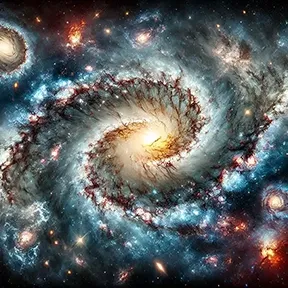Photons have consciousness

The question of whether elements of nature possess consciousness has fascinated both theologians and scientists alike. From the Quranic perspective, there are verses that point toward an intrinsic awareness in all aspects of creation, a concept that is now gradually aligning with modern scientific discoveries. One such verse is found in Surah Fussilat (41:11), where Allah commands the heavens and the earth to “come willingly or unwillingly,” and they respond, “We come willingly.” This passage raises intriguing questions about the consciousness or response mechanisms of the heavens, earth, and by extension, other elements of the universe.
Quranic Perspective on Consciousness in Creation
In Surah Fussilat (41:11), Allah speaks to the heavens and the earth when they are in a state of “smoke” — a form that can be associated with gases or primordial dust. The verse reveals that these entities, although non-human, have the capacity to respond to the divine command, signifying some form of awareness or consciousness. This concept is further supported by other Quranic verses where elements of nature — such as trees, mountains, and even inanimate objects — demonstrate an awareness of their Creator.
For instance, in Surah Al-Hadid (57:1), it is said:
“Whatever is in the heavens and earth exalts Allah, and He is the Exalted in Might, the Wise.”
This verse implies that every particle in the universe is in a state of glorification of Allah, even though we may not perceive how they do it. Similarly, in Surah Al-Isra (17:44), we are told:
“The seven heavens and the earth and all that is in them exalt Him. And there is not a thing except that it exalts [Allah] by His praise, but you do not understand their [way of] exalting.”
The Quran consistently reminds us that everything in existence, whether animate or inanimate, is engaged in worship and is capable of following divine instructions. This not only suggests a form of awareness but indicates a harmonious submission to the Creator’s will.
Modern Scientific Discoveries on Consciousness in Nature
In recent years, scientific research has begun to hint at a surprising conclusion: that plants, and perhaps even other elements of nature, may exhibit behaviors that resemble a form of consciousness or awareness. Studies have shown that plants can communicate with each other, respond to environmental stimuli, and even alter their growth patterns based on external threats. Some researchers have proposed that plants may possess a rudimentary form of cognition.
One fascinating discovery is related to “plant consciousness,” which suggests that plants can perceive their environment and react to it in ways that are purposeful and adaptive. This is evidenced by how plants release chemicals to warn neighboring plants of danger or how their roots can seek out water sources in seemingly intelligent ways.
Moreover, the study of quantum physics has also opened new doors in understanding the consciousness of matter. In quantum mechanics, particles such as photons, electrons, and atoms can exhibit behavior that seems to defy traditional explanations of physical matter. Some interpretations suggest that particles may have a form of consciousness, or at least a responsiveness, at the quantum level. While this area is still being explored, the idea that even particles of light (photons) may have some capacity for awareness ties into the Quranic portrayal of nature responding to the divine will.
Bridging Science and Faith
The Quranic verse (41:11) describing the heavens and earth responding willingly to Allah’s command is striking in light of these modern discoveries. The universe, in its primordial form of gas and dust, responds in a way that suggests consciousness, even before the formation of stars and planets. This aligns with recent discoveries about the reactive nature of matter at both macroscopic and microscopic levels.
Moreover, the Quran makes it clear that human beings may not fully comprehend how these elements of nature communicate or show awareness. Yet, through scientific exploration, humanity is beginning to uncover aspects of creation that point to the possibility of a broader form of consciousness, as described in Islamic scripture. The divine message in the Quran, which emphasizes that all of creation exalts Allah, is not in contradiction with scientific discoveries but rather enhances our understanding of the universe.
Conclusion
The Quranic perspective, particularly in Surah Fussilat (41:11), provides a profound insight into the nature of creation. It suggests that the heavens and earth, and by extension, all elements of the natural world, possess an awareness of their Creator. This aligns with recent scientific discoveries that hint at consciousness or responsiveness in plants, particles, and other natural phenomena. The exploration of these ideas further bridges the gap between faith and science, highlighting that modern discoveries often serve to affirm the timeless truths found in the Quran.
In the words of Allah: “And He shows you His signs; then which of the signs of Allah will you deny?” (Quran 40:81).





